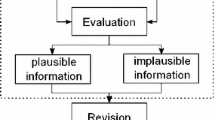Abstract
Traditional accounts of belief change have been criticized for placing undue emphasis on the new belief provided as input. A recent proposal to address such issues is a framework for non-prioritized belief change based on default theories (Ghose and Goebel, 1998). A novel feature of this approach is the introduction of disbeliefs alongside beliefs which allows for a view of belief contraction as independently useful, instead of just being seen as an intermediate step in the process of belief revision. This approach is, however, restrictive in assuming a linear ordering of reliability on the received inputs. In this paper, we replace the linear ordering with a preference ranking on inputs from which a total preorder on inputs can be induced. This extension brings along with it the problem of dealing with inputs of equal rank. We provide a semantic solution to this problem which contains, as a special case, AGM belief change on closed theories.
Similar content being viewed by others
REFERENCES
Alchourrón, C. E., Gärdenfors, P. and Makinson, D. (1985): On the logic of theory change: Partial meet functions for contraction and revision, J. Symbolic Logic 50, 510–530.
Benferhat, S., Cayrol, C., Dubois, D., Lang, J. and Prade, H. (1993): Inconsistency management and prioritized syntax-based entailment, in R. Bajcsy (ed.), IJCAI-93. Proceedings of the 13th International Joint Conference on Artificial Intelligence held in Chambery, France, August 28 to September 3, 1993. Morgan Kaufmann, San Mateo, CA, pp. 640–645.
Brewka, G. (1991): Belief revision in a framework for default reasoning, in A. Fuhrmann and N. Morreau (eds), The Logic of Theory Change, Lecture Notes in Artif. Intell. 465, Springer, Berlin, pp. 206–222.
Chopra, S., Georgatos, K. and Parikh, R. (2000): Relevance sensitive nonmonotonic inference on belief sequences, in Proceedings of NMR'2000, Full version appears in J. Appl. Non-Classical Logics, 2001.
Cross, C. B. and Thomason, R. H. (1992): Conditionals and knowledge-base-update, in P. Gärdenfors (ed.), Belief Revision, Cambridge Tracts Theoret. Comput. Sci. 29, Cambridge University Press, Cambridge, pp. 247–275.
Darwiche, A. and Pearl, J. (1994): On the logic of iterated belief revision, in Proceedings of Theoretical Aspects of Rationality and Knowledge, pp. 5–23.
Dubois, D., Lang, J. and Prade, H. (1994): Possibilistic logic, in Handbook of Logic in Artificial Intelligence and Logic Programming, Vol. 3, pp. 439–513.
Fagin, R., Halpern, J., Moses, Y. and Vardi, M. Y. (1995): Reasoning about Knowledge, MIT Press.
Fuhrmann, A. (1991): Theory contraction through base contraction, J. Philos. Logic 20, 175–203.
Galliers, J. R. (1992): Autonomous belief revision and communication, in P. Gärdenfors (ed.), Belief Revision, Theoretical Computer Science, Cambridge University Press, Cambridge, pp. 220–246.
Ghose, A. and Goebel, R. (1998): Belief states as default theories: Studies in nonprioritised belief change, in H. Prade (ed.), ECAI 98. 13th European Conference on Artificial Intelligence, Wiley, New York, pp. 8–12.
Grove, A. (1988): Two modellings for theory change, J. Philos. Logic 17, 157–170.
Hansson, S. (1997): Semi-revision, J. Appl. Non-Classical Logics 7(1-2), 151–175.
Hansson, S.-O. (1993): Changes of disjunctively closed bases, J. Logic, Language and Information 2(4), 255–284.
Hansson, S. O. (1999): A Textbook of Belief Dynamics, Kluwer Academic Publishers.
Hughes, G. and Cresswell, M. (1972): An Introduction to Modal Logic, Methuen.
Katsuno, H. and Mendelzon, A. (1991): Propositional knowledge base revision and minimal change, Artificial Intelligence 52, 263–294.
Kraus, S., Lehmann, D. and Magidor, M. (1990): Nonmonotonic reasoning, preferential models and cumulative logics, Artificial Intelligence 44, 167–207.
Lehmann, D. (1995): Belief revision, revised, in Proceedings of the Fourteenth International Joint Conference on Artificial Intelligence, pp. 1534–1540.
Meyer, T. (2001): Basic Infobase Change, Studia Logica 67, 215–242.
Meyer, T. A., Labuschagne, W. A. and Heidema, J. (2000): Infobase change: A first approximation, J. Logic, Language and Information 9(3), 353–377.
Nebel, B. (1992): Syntax based approaches to belief revision, in P. Gärdenfors (ed.), Belief Revision, Theoretical Computer Science, Cambridge University Press, pp. 52–88.
Poole, D. (1988): A logical framework for default reasoning, Artificial Intelligence 36, 27–47.
Reiter, R. (1980): A Logic for Default Reasoning, Artificial Intelligence 13, 81–132.
Rott, H. (1996): Change, Choice and Inference, Oxford University Press.
Spohn, W. (1988): Ordinal conditional functions: A dynamic theory of epistemic states, in W. L. Harper and B. Skyrms (eds), Causation in Decision: Belief, Change and Statistics, Proceedings of the Irvine Conference on Probability and Causation: Vol. II, Univ. Western Ontario Ser. Philos. Sci. 42, Kluwer Academic Publishers, Dordrecht, pp. 105–134.
Author information
Authors and Affiliations
Rights and permissions
About this article
Cite this article
Chopra, S., Ghose, A. & Meyer, T. Non-Prioritized Ranked Belief Change. Journal of Philosophical Logic 32, 417–443 (2003). https://doi.org/10.1023/A:1024888511283
Issue Date:
DOI: https://doi.org/10.1023/A:1024888511283



